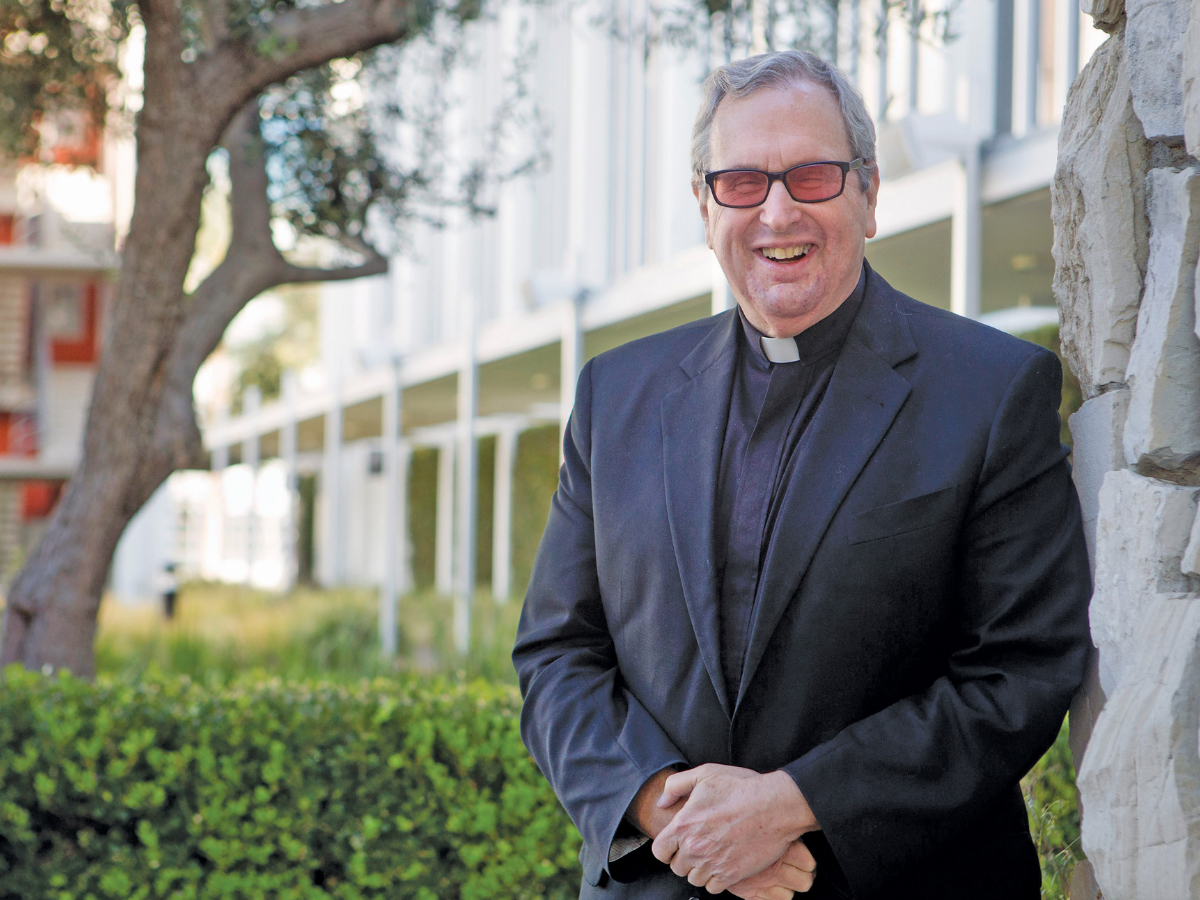Father Robert J. Spitzer, S.J., Ph.D., has a goal: To demonstrate to young people the existence of God using science and reason, so that they turn toward, not away, from God.
He has dedicated much of his life to this purpose, most recently by establishing the Magis (pronounced mah-jis) Center located in the Tower of Hope on the Christ Cathedral campus. The Center produces publications and educational materials for middle and high school students in Catholic schools around the country.
The goal is fascinating, focused and unique, like the Jesuit priest himself.
Fr. Spitzer was born in Hawaii in 1952, near Mount Tantalus, and lived there until he entered Gonzaga University in Spokane, Washington. Even as a young student he was drawn to philosophy, reading all he could—Camus, Sartre, Dostoevsky and Eli Wiesel’s book, “Night.” (Little did he know that he would one day become president of Gonzaga for 11 years.)
His inquisitive nature caused Fr. Spitzer to keep seeking answers. One day while walking down the corridor at Gonzaga University, he heard a professor in a classroom talking about proof of the existence of God and was riveted.
“Slowly but surely evidence came, along with this very deep intuition within me—I wanted to know everything about God and religion.”
A turning point came when he joined a friend in attending Mass every day as a Lenten practice. But after Lent was over he kept going.
“I was hooked,” he said. “I loved the homilies of the Jesuits. I was changing. My religion was becoming the most important thing in my life.”
From Gonzaga, Fr. Spitzer went to St. Louis University where he received a master’s degree in philosophy, then to Rome for his master’s in divinity (though his father had hoped he would go to law school).
While in Rome, he realized there was something wrong with his eyes. A specialist diagnosed retinitis pigmentosa, a degenerative disease which would eventually cause him to go blind.
“Emotionally I was devastated at first, but then I decided to look at the future and what I could do,” Fr. Spitzer recalled.
He continued on to the Weston Jesuit School of Theology in Cambridge, Massachusetts, and then proceeded to the Catholic University of America for his Ph.D., studying under Paul Weiss the well-known philosopher and metaphysician.
“Faith is a mystery, people said, but I wanted some evidence,” recalled Fr. Spitzer. “I was the wandering pest, constantly asking priests questions.”
The journey to becoming a priest himself was not simple.
“I wanted to get married and to have a family, but I wanted to make religion the center of my life,” Fr. Spitzer explained.
Finally, he decided to become a permanent deacon, but eventually became convinced that he should be a priest.
After nine years of studies and teaching he was ordained a deacon in Rome, and then ordained a priest in Seattle in 1983.
He began a career as a teacher, book author, theologian and speaker, connecting science and God. From 1998 to 2009 he was president of Gonzaga University and oversaw the expansion of academic and faith programs. Then at age 57, he became completely blind—a potentially debilitating experience. For Fr. Spitzer, it deepened his faith.
“First, it taught me humility. I’m not an arrogant type but I can definitely think I’m smart,” he said. “But when you bash into a few pillars in an airport, that’s a lesson in humility.”
He also learned to rely on other people.
“Nobody is self-sufficient,” he said. “For a long time, I was a very independent thinker. I thought ‘I can do this myself.’ Now I can’t do it myself. Blindness helps form a communion of people around you to help get things done. It’s a labor of love and that was a blindness discovery.”
And finally, “The best thing about blindness is that you’re just going to have to trust God. He’s going to help you and take care of you in tough situations.”
As Fr. Spitzer continued his exploration of science and faith, his idea for the Magis Center began to form. He first established it as an organization to facilitate retreats for business and professional leaders, but then he and his colleagues changed the mission of Magis to what it is today—a center that demonstrates the connections between faith and reason, through books, videos, blogs and educational materials. He’s even addressed the possibility of the existence of alien beings—which neither surprises nor alarms him.
“God would have to give souls to those alien beings,” he said.
But his main concern is the younger generation.
“Forty-two percent of church-going Catholic kids leave the Church and God altogether because of a lack of evidence,” said Fr. Spitzer. “The primary purpose of the Magis Center is to bring together faith, science and reason—it is the greatest need that we have in our Church today.”

